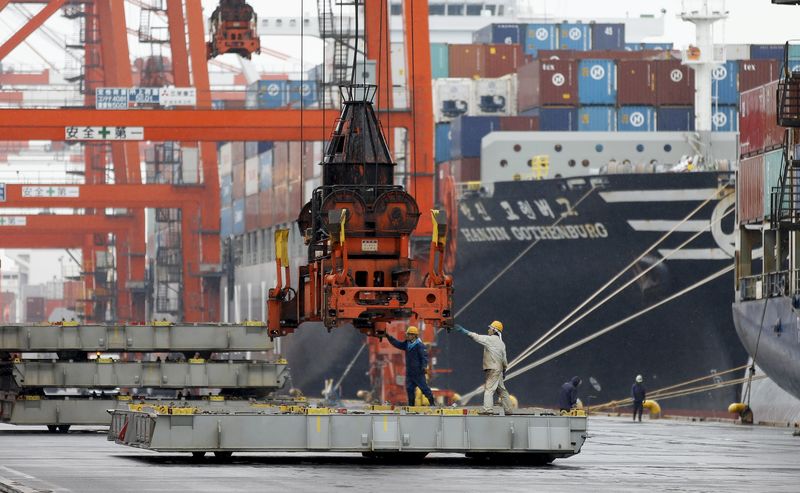By Stanley White
TOKYO (Reuters) - Japan's exports slowed for a second straight month in August in a worrying sign that China's economic slowdown could deal a damaging blow to the world's third-biggest economy and force policymakers to inject fresh stimulus before too long.
The data joins a string of depressing shipment numbers in key regional economies - including South Korea and Taiwan - which has heightened anxiety over a China-led slowdown in global growth and tempered bets of the U.S. Federal Reserve lifting rates for the first time in almost a decade later on Thursday.
Slowing exports could increase the chance of additional monetary easing from the Bank of Japan, because this could lead to lower factory output, slack economic activity and less momentum needed to offset deflationary pressure caused by a collapse in oil prices.
"Our house view is that the BOJ will ease again in January, but the economic data suggest an increasing chance the BOJ will move at the end of October," said Hidenobu Tokuda senior economist at Mizuho Research Institute.
The Finance Ministry said Japanese exports in August rose 3.1 percent on-year, smaller than the median estimate for 4.0 percent growth expected by economists in a Reuters poll, and less than July's 7.6 percent year-on-year rise.
Exports destined for China, Japan's largest trading partner, fell 4.6 percent in August from a year ago, compared with July's 4.2 percent annual increase.
The decline was the first since February due to falling shipments of car parts and electronics, with exports to Asia rising 1.1 percent year-on-year in August, slowing from a 6.1 percent increase in July - another sign of the China-slowdown effect on demand.
"I wouldn't be surprised if exports started falling. This is worse than the BOJ anticipated," Tokuda said.
Indeed, while exports to the United States have been a bright spot, growth slowed in August. Exports rose an annual 11.1 percent last month versus an 18.8 percent rise in July.
BOJ's DAUNTING CHALLENGE
In a measure of the challenge facing the Bank of Japan's goal of sparking inflation towards its 2 percent goal, ratings agency Standard & Poor's on Wednesday downgraded Japan's credit rating by one notch to A+ and cast doubt about Tokyo's economic revival strategy.
The BOJ left unchanged its quantitative easing on Tuesday and Governor Haruhiko Kuroda voiced confidence that Japan can weather the hit from China's slowdown.
While Japan's economy is expected to expand in July-September after a 1.2 percent annualised contraction in the previous quarter, a surprise decline in industrial production in July led a few economists to warn about the risk of a recession.
The monthly Reuters Corporate survey, which was published earlier on Thursday, also showed growing concern about demand for Japanese goods abroad.
"Infrastructure-related demand is hitting new lows," a manager at a rubber company that exports to China said in the survey.
"On top of that, starting with the electronics parts sector, we are really feeling a slowdown in a wide range of industries."

(Story corrects link to story in 10th paragraph)